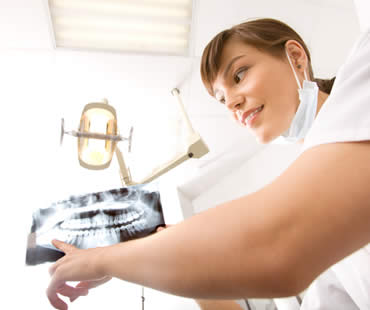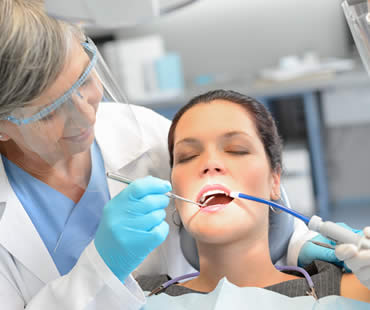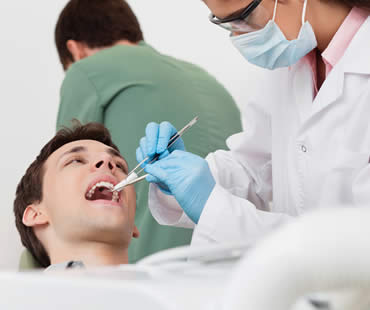
If oral surgery is in your future, you might be worried about what’s to come. The way to relieve that worry is to talk to your oral surgeon. Your oral surgeon has the experience and knowledge necessary to guide you through whatever concerns or questions you may have. Here is a guide to some of those questions and answers:
How will I handle pain following surgery?
- In many cases, you will have been prescribed narcotic pain relievers. If you are taking narcotics, take them only as recommended and do not mix them with over-the-counter pain relievers or alcohol. Driving while on narcotics is dangerous and can have serious consequences for you personally and for others. If you weren’t prescribed any medication, use anti-inflammatory analgesics such as ibuprofen or naproxen sodium.
What will happen to my stitches in the days following surgery?
- Some stitches will be designed to dissolve over time and will not need to be removed. Others will not come out on their own and will need to be removed at a subsequent appointment. In many cases, losing a single stitch or two in the days following surgery isn’t serious; however, for bone-graft treatments, it is problematic and you should contact your surgeon immediately.
Can I eat normally after surgery?
- Immediately after surgery when you’re still experiencing any mouth or tongue numbness, don’t eat anything. You could mistake the soft tissues of your mouth for food and do serious damage to your mouth without realizing it. After your numbness subsides, consume soft foods of tepid temperatures for several days to allow for healing. Talk to your surgeon to learn when you can resume normal eating patterns as dictated by your particular surgery.
What other tips do you have?
- Stay hydrated and rest as much as possible to facilitate complete and quick healing. Call your surgeon if you have excessive bleeding or pain that doesn’t lessen with time. Be aware of signs of infection (swelling, redness, odorous or sour discharge) at the surgical site and seek professional care when needed.
We look forward to seeing you in our Fernandina Beach dental office

Do you have apprehensions regarding dental exams or therapies? Do you find yourself worrying about your teeth and concerned about exams? You are not alone. Many people experience anxiety or fear regarding the dentist’s office. You might want to consider sedation dentistry.
Qualified sedation dentists are able to work with you to get the dental care you require without the burden of fear or nervousness that might lead you to postpone work.
Sedation dentistry therapies are overseen and administered by specially trained dentists and dental technicians. These dental professionals have undergone hours and hours of special education in sedation equipment, techniques and medications. These trained individuals are aware of the best sedation options for each patient type, and they can administer them safely and reliably.
If you are thinking about sedation dentistry for your next dental treatment, consider the following:
- How much education does the dentist have related to sedation dentistry? What continuing education programs have been completed that specialize in anesthesia and conscious sedation?
- What organizations does the dentist belong to that provide ongoing education to keep the dentist and staff apprized as to the latest techniques and research? A good sedation dentist is always looking to learn new procedures that can benefit his or her patients, and can do so through professional organizations such as the American Dental Society of Anesthesiology.
- What equipment is in place to monitor a patient’s level of sedation? Sedation dentistry cannot be safely practiced without a pulse oximeter and oxygen equipment. Medications should be on-hand to reverse any rare reactions to the sedation.
It’s your right as a patient to have answers to these and all of your questions before you undergo any dental therapy. Your dentist should be very forthcoming. Having the right information allows you to make the right decisions for you and your dental care. Talk to your dentist today regarding these and any questions you have about sedation dentistry or his or her qualifications. Get the best care you need, and skip the worry!
We look forward to seeing you in our Fernandina Beach dental office

Today’s cosmetic dentistry offers an extensive array of treatments and procedures to help restore a beautiful and healthy smile. While you may never have considered cosmetic dental procedures as a solution to your dental concerns, there are quite a few reasons you may want to consider for seeking cosmetic dental treatment:
- Crooked, cracked or decayed teeth can be corrected through bonding, crowns, and veneers, returning your smile to its once vibrant and healthy appearance.
- Decay and disease can cause you to lose teeth, creating gaps that hollow your face and age your appearance. Cosmetic dentistry offers a wide variety of options such as dental implants for restoring missing teeth, keeping your smile and face younger looking.
- Teeth that have yellowed or discolored over time due to wine, tobacco or staining foods can be lightened up to ten shades with professional teeth whitening treatments performed by a qualified cosmetic dentist.
- “Horsey” looking teeth or “gummy” smiles can be corrected through gum re-contouring or restructuring to create a younger, more appealing smile.
- Misaligned or gapped teeth can be straightened through orthodontia such as Invisalign that is virtually invisible and pain and hassle-free.
Some cosmetic treatments may be offered by your family dentist, but you may want to consider a consultation with a qualified cosmetic dentist to find out more about the full array of treatments available to address your cosmetic dental concerns. Many procedures are quick and painless, and can be combined with other cosmetic treatments to achieve the results you desire. With the help of cosmetic dentistry and proper oral care, you can be assured a confident, more perfect smile.
Our dental office is located in Fernandina Beach

Facing dental issues are a fact of life, no matter your age. The likelihood is almost certain that at least one member of your family will require dental treatment at some point, not to mention the need for regular checkups and cleanings. The promise of dental care being required by every family member means that it can be beneficial to have a family dentist who can take care of each one’s oral health.
Although you might choose to seek oral care from a general dentist, there are some unique advantages that family dentists offer. First and foremost, a family dentist treats every member of your family no matter their age. This type of dental practice is comfortable handling any age group, while a general practice might not be as prepared for the young and old and everyone in between.
Another benefit is that you can find a single family dental practice and not have to keep looking for a dentist for each family member. You can convey your family information one time to one office, and the staff will get to know all of you. The dentist and staff will learn about the oral health of every family member, and you can feel confident that each person is receiving the same quality care.
Once you choose a family dentist, everyone will know what office to go to and may even be able to make joint appointments. It will be easy to communicate with a single location, and you’ll grow comfortable in dealing with the same group of people for every family member. Many people appreciate having a long-term professional healthcare relationship, and feeling confident in the care and experience each member of your family will have there.
Our dental office is located in Fernandina Beach

It is vital for parents to understand not to wait until an oral health problem arises to begin dental treatment for their kids. Parents should be aware that in order for children to have the best chance for healthy teeth and gums throughout life, preventive dentistry is one of the keys.
Good oral care should begin when your child is an infant. As soon as babies start drinking milk, sugars can attack the gums even though there aren’t any teeth yet. To avoid damage, clean your child’s gums by gently rubbing them with a damp soft cloth. Around age one, schedule your child’s first appointment with the dentist. The examination will include looking for any issues, teaching home care, and allowing your child to become accustomed to a dentist setting.
As you child grows, dentists and parents can partner together to teach preventive dentistry habits to children. Dentists can show parents the ideal ways to guide children in proper brushing and flossing, and parents can ensure that the methods are carried out consistently at home. You and your dentist may decide together as your child grows whether to opt for dental sealants to help protect your child’s teeth from potential decay and cavities.
Another aspect of good oral health that parents should be involved in is providing nutritious foods for their children. Your dentist can educate your family on the best foods for your teeth and gums, as well as the foods and drinks to avoid. Some items are known to contribute to tooth decay, gum disease, and staining. Teaching your child to make healthy diet choices will promote a healthy mouth.
Preventative dentistry both at home and in your dentist’s office will make your child feel confident about oral care and become comfortable with the dentist. If the time comes for more extensive services, your child will likely trust the dentist and have less apprehension about the dental visit. Good preventive care, however, helps avoid problems and your child will be less likely to encounter major problems requiring painful procedures and lots of time in the dental chair.
If you live in the Fernandina Beach area contact us today

There are a number of reasons that dentists or oral surgeons recommend surgery, but facial injuries are probably the most unexpected and alarming cause. Maxillofacial injury, or facial trauma, refers to any injury to the mouth, jaw, and face. Most of these injuries result from sports, car accidents, job accidents, violence, or an accident at home. Let’s learn about oral surgery resulting from facial trauma.
Broken bones are a common type of serious facial injury. Fractures can occur in the upper or lower jaw, cheekbones, palate, and eye sockets. Injuries in these locations may affect vision and the ability to eat, talk, and breathe. Hospitalization is often required for treatment, which is similar to that for fractures in other parts of the body. The bones must be lined up and held in place to allow time to heal them in the correct position. Because casts are not possible in facial injuries, the surgeon may use wires, screws, or plates to treat fractures. Sometimes healing takes as long as six weeks or more.
Even though some facial injuries are worse than others, all of them should be taken seriously. They affect an important area of the body, so it is recommended to seek treatment from an oral surgeon to make sure you receive optimum care. Even if stitches are all that’s required, it’s best to have them performed by an oral surgeon who can place them exactly as needed to produce the best results.
It’s no surprise that the best solution for facial injuries is to prevent them in the first place. Oral surgeons suggest consistent use of mouth guards, seat belts, and masks and helmets as required. Improvements have been made to safety gear to make these items more comfortable and efficient, so there should be no excuses for not using them to protect yourself and avoid injuries that can lead to oral surgery.
Schedule your appointment at our Fernandina Beach dental office







